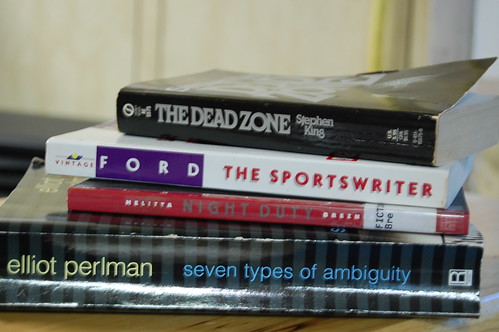 Case in point: Stephen King is a master of showing. In The Dead Zone he doesn't tell us that Greg Stillson is an evil man, he shows us by having him sell cheap, overpriced Bibles to rural residents which fall apart days after the purchase, and most of all, by kicking a farm dog to death for no reason other than it annoyed him. He doesn't come right out and say this man is evil, he shows us.
Case in point: Stephen King is a master of showing. In The Dead Zone he doesn't tell us that Greg Stillson is an evil man, he shows us by having him sell cheap, overpriced Bibles to rural residents which fall apart days after the purchase, and most of all, by kicking a farm dog to death for no reason other than it annoyed him. He doesn't come right out and say this man is evil, he shows us.It is easy for the reader to draw the right conclusion from the scene he presents. So whenever you have a choice, try to present the scene to the reader and not tell him what conclusions to draw from it. Let your words paint the picture and create the sensations of being there.
The Sportswriter – Richard Ford (1986)
This book makes you feel like you have sat down with an interesting person who is telling you his life story. This is an engaging first-person point of view, which suggests several of the conflicts to come within the story; giving up a literary career to be a sportswriter, unresolved grief from the death of the child, and possibly conflict with an ex-wife. There is no dialogue per se yet, but the description and the telling of the tale urges me to read on. On to the next round.
Seven Types of Ambiguity – Elliot Perlman (2003)
I like the concept described on the back cover the book. It is divided into seven sections with each having a completely different narrator, which changes the point of view dramatically. The book is covered with rave reviews on the back cover, front cover and inside pages. I also like the first person narrator voice for the first five pages because it is so conversational. The thing I like about this section is that the narrator describes the character, Simon, by how the narrator thinks he is seen by Simon. It's still unclear to me whether the narrator is male or female. I am very intrigued by this unusual point of view and the lyrical description of these characters. The seven section structure, mentioned on the back cover, also intrigues me. This one goes to the next round.
The Dead Zone – Stephen King (1980)
This book spawned a movie and a successful USA series starring Michael Anthony Hall, so what else does it need? It is amazing that I haven't read this book yet since it features some of my favorite subjects, Armageddon, predicting the future, and impossible choices. The other thing that makes this great is within the first five pages Stephen King shows that he's a master of showing not telling. He doesn't specifically tell us what Johnny's cryptic warning means when he awakens from the bump on the head which gave him predictive powers. He shows us. He doesn't tell us that Greg Stillson is an evil man, he shows us, and in such an intriguing way that compels you to keep reading. This one goes the next round.
Night Duty – Melitta Breznik (1999)
There are a couple things right off the bat that I do not like about this book. The first of which is the lack of any dialogue. Flipping through the first 20 or 25 pages of the book, I do not see any dialogue whatsoever, and long, dense paragraphs of text. The first pages provide detail for an autopsy and has a somewhat artificial beginning with "the story begins a long time before my birth, in the German city during the war…”
I don't like pages of long description with no hook, no apparent character or conflict. This one never had a chance. It is eliminated.
Books Eliminated So Far (and available if you want them):
- 21 – Jeremy Iversen (2005)
- Farm Fatale – Wendy Holden (2001)
- Freezing -- Penelope Evans (1997)
- Stronghold: Dragonstar Book 1 – Melanie Rawn (1990)
- Man of the House – Stephen McCauley (1996)
- Strawberry Tattoo -- Lauren Henderson (1999)
- Lying Awake -- Mark Salzman (2000)
- The Feast of Love -- Charles Baxter (2000)
- Love Invents Us -- Amy Bloom (1997)
- Night Duty – Melitta Breznik (1999)
- Lord of Chaos (Wheel of Time Book 6) – Robert Jordan (1995)
- Crown of Swords (Wheel of Time Book 7) – Robert Jordan (1997)
No comments:
Post a Comment